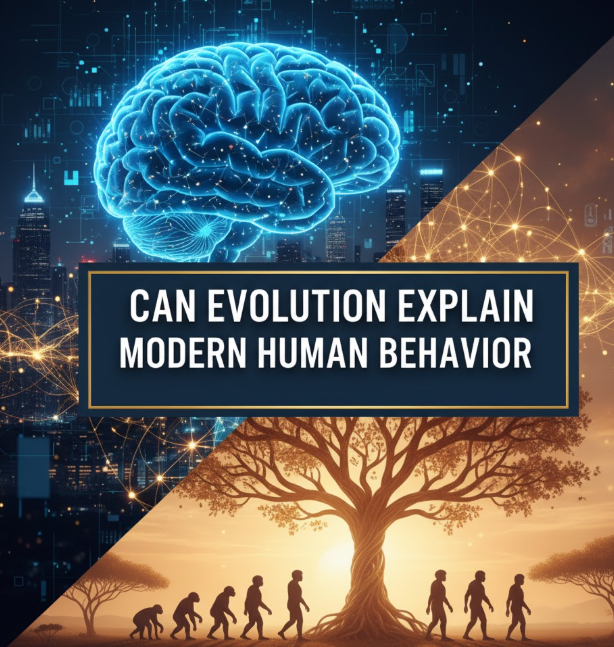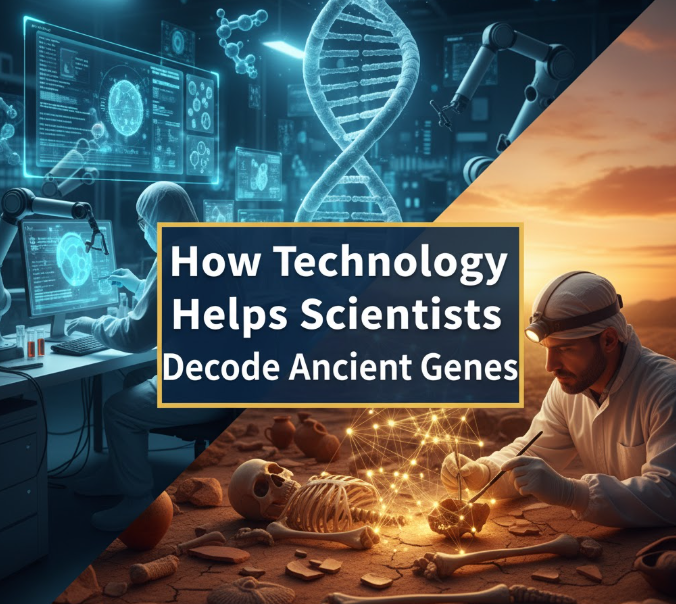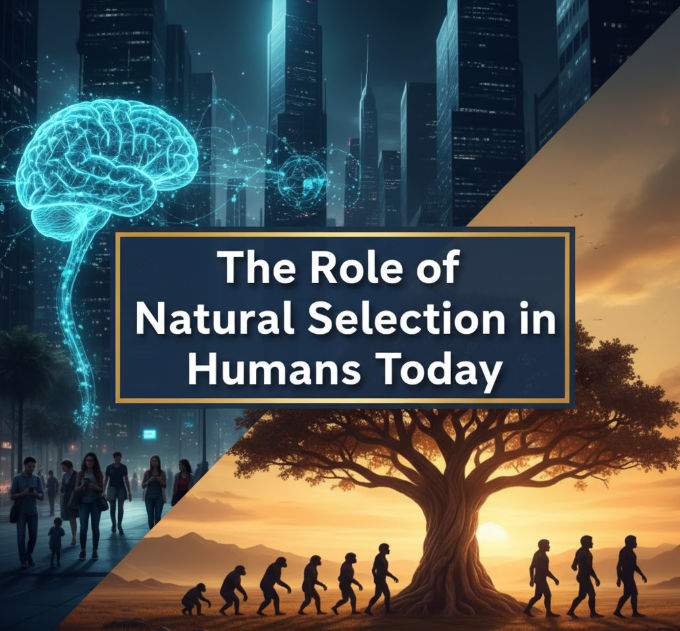Have you ever been curious why your stomach feels jittery before a big presentation? Or why some folks thrive on taking risks and others play it safe? The solution could rest in our evolutionary history, reaching back tens of thousands of years to the time when our ancestors lived in small bands, hunted for sustenance and confronted the kind of challenges that are very different from those we face now.
It is not only that opposable thumbs and two legs evolved. It’s believed to have also influenced many of the behaviors, emotions and social dynamics we observe in humans today. But does evolution actually account for why you procrastinate on your homework, why social media seems so addictive or why people fall in love? This article examines the tantalizing link between our ancient history and current behaviors, and asks what evolution can tell us — and cannot tell us — about how we live now.
What’s Evolution Got To Do With Behavior?
Evolution is the way that living things change over time, over many generations. Traits that enhance the ability of an organism to survive and reproduce tend to be common in a population over time. This rule doesn’t just work for physical traits such as sharp teeth or camouflage patterns. Now scientists know that behaviors can evolve, too.
Our ancestors who made smart decisions — say, working well with others, staying away from dangerous predators, finding worthwhile foods to eat — were far more likely than our forebears who didn’t to stay alive long enough to have children. Over many generations the psychological mechanisms that led to these successful responses became ingrained as aspects of human nature. This discipline is called evolutionary psychology, and it seeks to explain how natural selection designed the human mind.
Here’s one way to think about it: your brain is a smartphone that still runs some extremely outdated apps. That software was created for a planet that had no cities, no schools and not even the internet. This tendency of ours manifests in a host of both endearing and afflictive ways, from an irrational fear at the prospect of public speaking to making mountains out of molehills over our favored political candidate’s prospective victory. Many such automatic reactions and feelings made good sense 50,000 years ago but now seem downright weird or troubling in contemporary life.
The Old Brain in the New World
To see how evolution affects behavior we must realize that more than 95% of these years were spent as hunter-gatherers. Our ancestors lived in small bands of between 25 and 150 people, moved constantly to find new sources of food and frequently confronted predators, starvation and rival groups.
The human brain is adapted to solving problems that were vital for survival in this environment. Natural selection was selective for those who could:
- Spot threats fast and respond with fear or aggression
- Form tight bonds with group members for survival
- Remember water and food sources
- Read faces and social cues
- Status competition within the group is also a factor
- Settle for healthy mates that could potentially bear offspring
These were literally matters of life and death skills. Those who didn’t have it were less likely to live long enough to reproduce. Today, we’ve inherited these psychological functions, despite the fact that the world has radically changed.
Why We Crave Sugar and Fear Snakes
Some modern behaviors are perfectly logical from an evolutionary perspective. Consider our love of sugar and fatty foods. In the ancestral era, calories were scarce and difficult to get. Fruits, honey and fatty meats offered concentrated energy that might be the difference between life or death from starvation. Those people with a hankering for these foods and those who ate as much of them as possible when they were available had an edge in survival.
Fast forward to the present, and that same need creates issues. We are awash in cheap, calorie-dense snacks, but the primitive wiring in our brains still behaves as if we might not eat again for days. This mismatch between what we’ve evolved to prefer and our modern environment is one contributor to the obesity epidemic.
The same goes for the fear of snakes and spiders. Even people who have never lived in cities populated by dangerous animals often possess instinctive fear reactions to such creatures. Meanwhile, we don’t have a reflexive terror of the genuinely deadly modern dangers in our midst — cars, electrified outlets. Why? Since snakes and spiders were serious threats for humans throughout their evolutionary history, while cars have been around as a danger only for about 130 years — not nearly long enough to evolve our own built-in fear response.
Social Behavior: Why Reputation Is So Important
Humans are incredibly social, and evolution has a lot to say about why we do the things we do with each other. Your reputation was life and death in tiny ancestral groups. And if other members of the group perceived you as selfish, unreliable or untrustworthy, you might get excluded from it — a sentence close to death.
This may be why we care so much about what others think of us. That moment of total embarrassment after you’ve botched something in public? That’s your brain wanting you to keep up social appearances. The satisfaction that comes from someone commending your work? That is a reward for behavior that enhances your reputation.
Gossip is a similarly ingrained behavior, from an evolutionary perspective. In ancestral environments, information about who could be trusted, who was a good hunter or who was cheating on their partner could be extremely valuable. Those groups that communicated well could make better decisions about when to cooperate and punish each other. Today, the role of gossip seems to be roughly the same, even if we feel more guilty about participating in it.
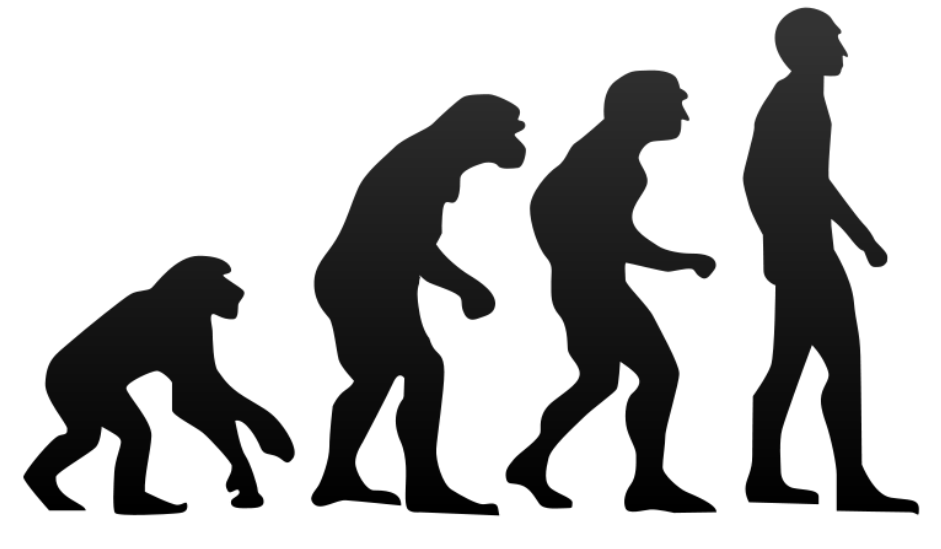
Evolutionary Mismatches in Contemporary Living
| Prehistoric Environment | Evolved Response | Contemporary Environment | Effect |
|---|---|---|---|
| Calorie scarcity | Crave sugar/fat | Addictive junk food | Obesity, diabetes |
| Tribal threats | Fear outgroup | Large nation states | Racial tension |
| Rare public speaking | Stage fright | Diverse audiences | Panic attacks |
| Face-to-face interaction | Seek approval | Anonymous online spaces | Cyber-harassment |
| Limited information | Crave novelty | Social media feeds | Information overload |
| Real physical threats | Animal alarm system | Minor daily stressors | Chronic anxiety |
Love, Attraction, and Choosing Partners
Evolution has especially powerful accounts of romantic behavior. Prior to modern society, selecting the perfect mate was among a person’s most critical decisions. Your decision affected not only your happiness but also your survival, as well as the success of your children.
Men and women appear to have evolved less similar mate preferences, indicating that waves of reproductive challenges shaped the sex-specific priorities. Women, who invest more in pregnancy and child-rearing biologically, are also more inclined towards partners that exhibit signs of being able to provide resources and protection. Men, for whom offspring are potentially less individually costly than for women, generally reveal more interest in clues linked to reproductive capacity.
That is not to say that these preferences dictate all of our choices — the culture we are raised in, our individual personalities and personal experiences play a huge role. But evolutionary psychologists say these basic instincts still do in fact push people toward one another in culturally uniform ways.
The strong emotions of romantic love — the butterflies, the obsessive thinking and even risky behavior that result from it — all also make evolutionary sense. These emotions inspired our ancestors to pair up in bonds that allowed them to raise children successfully despite our taxing environment.
Aggression, Competition, and Status-Seeking
The gain from having status within the group has been real, throughout human evolution. Higher status brought better food, more desirable mates and more allies for protection. This led to powerful evolutionary pressure to struggle for status and to care deeply if not obsessively about our rank in comparison with others.
We see those tendencies everywhere today. Students compete for grades, athletes compete for championships, businesses compete for customers and people compete frantically to gain followers on social media. The competitions themselves may differ, but the underlying spirit is the same.
Young men are significantly more likely to take risks and compete than women. Evolutionarily, it makes sense. In the environment of evolutionary adaptedness, men who took risks and competed effectively would have had a large impact on their reproductive success. Playing it safe wasn’t always beneficial.
This doesn’t give a free pass to harmful aggressive behavior — understanding the evolutionary roots of some behavior isn’t the same as saying it’s OK or unchangeable. But it does help explain why certain patterns show up again and again in diverse cultures and historical periods.
-
💪 Read next: 10 Evolutionary Traits That Make Us Who We Are
Cooperation and Altruism: The Puzzle of Helping Others
One of the behaviors that stumped evolutionary scientists at first was altruism, helping others in ways that might be costly to yourself. If evolution is about survival and reproduction, why do we sacrifice for others?
Several evolutionary mechanisms that explain cooperation have been discovered by scientists:
Kin Selection: We’re more apt to assist family members because relatives contain our genes. By helping a brother or cousin to survive, your genetic family also gets through, even if you don’t get reproductive success.
Reciprocal Altruism: “You do me a favor, I’ll do you one back.” Assisting someone who might have the chance of returning the favor in the future is a sound survival strategy. Those of our ancestors who worked well together were successful, and the pure freeloaders among them could be detected and excluded.
Reputation and Indirect Reciprocity: It may well pay to help strangers, if being helpful earns you a good reputation as a known generous person. All members of small ancestral groups would have known one another’s behavior. People were drawn to help those with good reputations.
Group Selection: Cooperative groups could out-compete groups of defectors. This exerted pressure toward pro-social behaviors that were beneficial for everyone overall.
It’s why humans can be extraordinarily generous and cooperative, while still indulging in no shortage of competition with one another.
What Evolution Cannot Explain
Though evolution can give us some incredible insights into human nature, it’s also key to remember its limitations. Not all behaviors have obvious evolutionary explanations. Some important points to remember:
Culture matters enormously. Humans learn from their societies and cultural evolution occurs orders of magnitude faster than genetic evolution. The particular languages we speak, the food we eat and so much else — far from being reducible to evolutionary considerations, these can be worlds away between cultures.
Individual differences are real. Evolution accounts for general tendencies in human psychology, not why exactly you chose your major or what movie you have a crush on. We are all products of our personal experiences, relationships and choices.
Modern behaviors aren’t always adaptations. Some of what we do is a side effect of adaptations meant to serve other functions. For instance, we weren’t selected for the capacity to read — writing was invented just 5,000 years ago. Instead, reading co-opts brain systems that evolved for other purposes — such as identifying objects and processing language.
Evolution doesn’t render behaviors inevitable or cast them in stone. Knowing the evolutionary origins of a behavior is not the same as being slaves to our genes. Humans are incredibly malleable, and can override evolution with conscious effort, the support of friends and family, and cultural practices.
The Controversial Side of Evolutionary Psychology
Evolutionary accounts of human behavior are highly contentious and the critics have some good points. There is some fear that evolutionary psychology can be appropriated to justify inequality or harmful behaviors by claiming they’re “natural.” This is a dangerous manipulation of the science — and what’s natural isn’t always good or right.
Others have criticized evolutionary psychology for producing “just so stories” — explanations that may sound reasonable but are difficult to test scientifically. We certainly can’t time travel to see our ancestors or conduct experiments on hunter-gatherer societies, after all.
Another worry is that it may be an oversimplification of complex behaviors. Human behavior reflects the interplay of genes, development, culture and individual experience. If we focus too strongly on evolution, we are likely to overlook these other essential elements.
However valid these criticisms, most scientists also believe that the theory of evolution has had an impact on human psychology. The trick will be to do evolutionary thinking well and combine it with the insights of other fields, from anthropology and sociology to neuroscience. For a deeper dive into the science of evolutionary psychology, explore additional research on how evolution shapes the mind.
Practical Applications: Using Evolutionary Insights
It’s not just academically interesting to know what the evolutionary roots of behavior are — it has practical applications. Here are some examples:
Health & Nutrition: Understanding that we’ve evolved to seek out calorie-dense foods can guide the best weight loss strategies. We don’t have to depend on willpower alone; we can alter our environments so they better foster healthy decisions.
Education: Knowing that children’s brains evolved to learn through play, storytelling and apprenticeship — not sitting in rows listening to lectures — can help us design more effective systems of education.
Mental Health: The mismatch between our evolved psychology and modern environments may be responsible for much anxiety and mood disorders. This view may help to diminish stigma and imply novel treatments.
Workplace Design: Appreciating that humans need to be connected with others, long for status and crave a sense of meaningfulness in their work can help organizations design more satisfying workplaces.
Technology Design: Knowing both what inspires human attention and why it does so can allow us to design technology which acts according to our real interests not by exploiting our psychological weaknesses.
Sources of Human Behavior
Human Behavior = Evolutionary Adaptations (40%) + Cultural Learning (30%) + Individual Experience (20%) + Current Environment (10%)
Note: These percentages are illustrative and can vary dramatically depending on the particular behavior. The critical point is that they all interact to cause behavior.
The Future of Human Behavior
One interesting question is whether human behavior is going to be further shaped by evolution. In one sense, yes — evolution never stops, so long as some members of the population have more children than others. But natural selection is a glacial process, and modern medicine and technology have mitigated many of the timeless survival pressures that once could be counted on to shape our species.
Some scientists conjecture how modern environments could be influencing future evolution. For instance, if people who need less sleep seize more hours at work and making money, could the genes that support shorter sleep spread? If social anxiety undermines peoples’ dating success, could the humans of tomorrow grow less introverted?
These scenarios remain speculative. In reality, cultural and technological shifts take place much more quickly than genetic evolution does, so they are likely to have far greater influence on the direction of future human behavior.
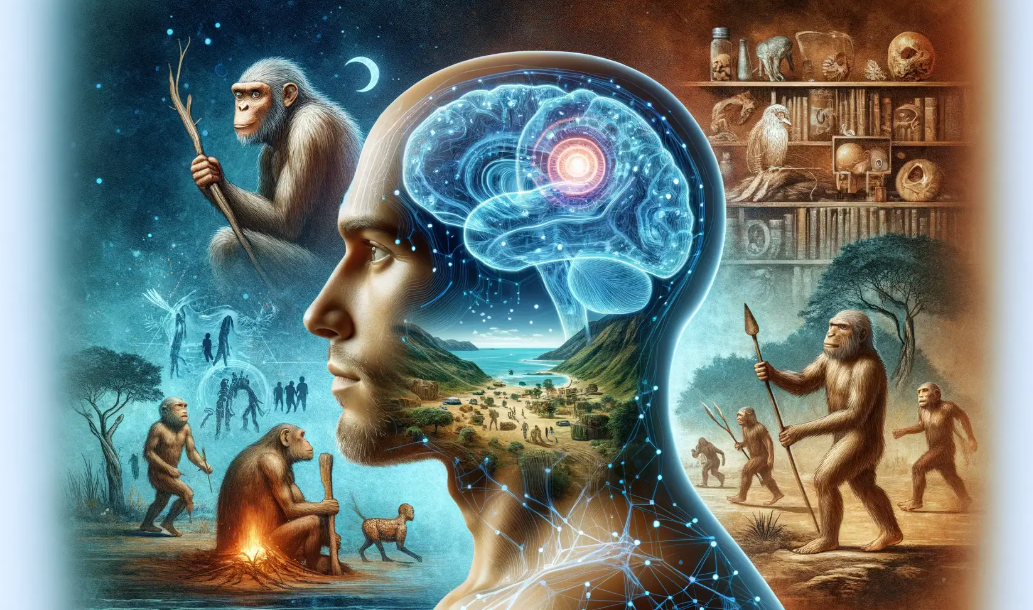
Frequently Asked Questions
Can evolution explain mental illness?
Evolutionary views illuminate certain mental health problems. For instance, anxiety disorders could be connected to an overactive threat detection system designed for life in ancestral environments. Depression could be associated with an evolved response to loss or low social status. But mental illnesses are complex disorders with many causes, and evolutionary explanations represent only part of the picture. They shouldn’t be invoked to stigmatize or assume that mental illness is somehow “natural” and should not be medically treated.
Is behavior predetermined by evolution?
No. Evolution shapes behavioral predispositions and preferences, but it does not dictate specific behavior. We are endowed with free will and conscious control over our choices, and can override evolutionary imperatives. Behavior is also influenced by culture, education and one’s own values in addition to evolutionary impact. Human beings are incredibly flexible, adaptable creatures.
If evolution shaped our behavior, why do people in different cultures act so differently?
General psychological mechanisms and tendencies were created in the course of evolution that are universal in the human species, but manifest themselves differently because of cultural variation. Think of it as a recipe that takes local ingredients — the basic structure is the same, but the resultant dish changes. Culture is what fills in the form predetermined by our biological equipment.
Can we predict how someone will act if you place them in a certain setting?
Not with precision. Evolutionary psychology accounts for statistical tendencies in large populations, not individual actions. There are many considerations that determine what any given person does in a particular situation. But these evolutionary insights can provide insight into why some behaviors are popular and what psychological mechanisms make them possible.
Is evolutionary psychology sexist or an excuse for inequality?
Some have improperly used evolutionary concepts to defend their exploitation and abuse of others, but that is an inappropriate application of the science. Evolutionary psychology explains how behaviors came to be; it doesn’t prescribe how a society should structure itself. The recognition of evolved differences isn’t to say one group is better than the other, nor does it mean that contemporary social hierarchies necessarily are either inevitable or desirable. Good evolutionary science is descriptive, not prescriptive.
Bringing It All Together
So does evolution explain modern human behavior? The answer is yes and no: Evolution does offer important clues about why we have the psychological predispositions, emotional responses and social structures that we do. A great many otherwise mysterious things about human beings make perfect sense once we view them through an evolutionary lens.
But it’s only one piece of a very big puzzle. Culture is important, as are personal experiences, development and current conditions that influence behavior. We are not automatons playing out programs written in our genes; we are flexible, creative beings with the power to reflect on our urges and make choices with our wonderful brains.
Knowing the evolutionary roots of behavioral proclivities doesn’t excuse bad behavior nor make change impossible. Instead it affords us valuable insight into our own psychology. When we know why we’re pulled toward junk foods, or why we care so much about social standing, or why we tend toward tribalism with outsiders, then we can make informed decisions on how to design a more thoughtful world that brings out the best in us.
The human mind is a remarkable thing, honed over millions of years of evolution, and yet living in a world our ancestors wouldn’t even recognize. We haul ancient instincts into modernity, occasionally fitfully adapting to the mismatch but also taking advantage of our evolved abilities for creativity, cooperation and problem-solving to develop astonishing civilizations. It is this mix of the old and new, instinct and reason, that makes human behavior infinitely interesting to study and understand.

